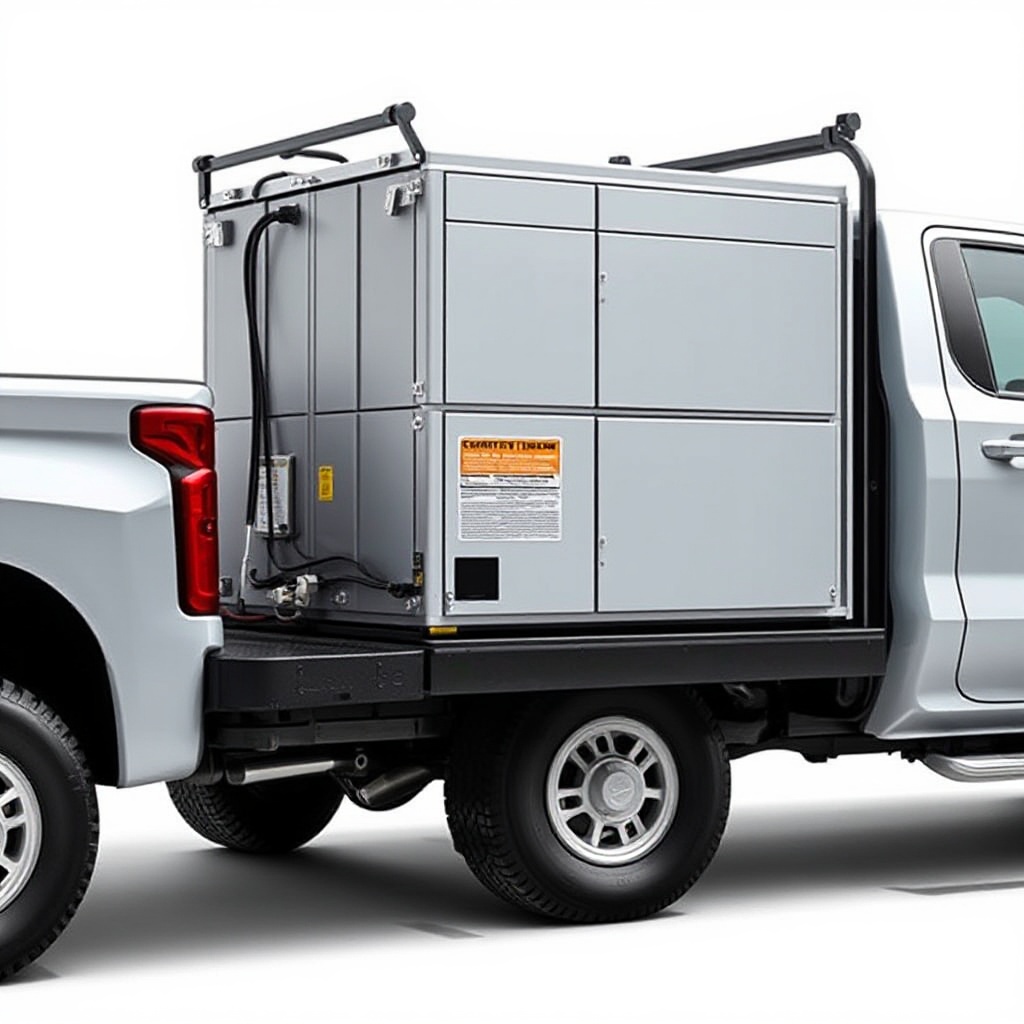Chevrolet Silverado EV Work Truck breaks records with 539-mile range in real-world testing, challenging perceptions of electric trucks with its massive battery capacity.

Drivetech Partners
The Chevrolet Silverado EV Work Truck has shattered electric vehicle range expectations by achieving an astonishing 539 miles in Edmunds' real-world testing, dethroning the previous champion Lucid Air and exceeding its EPA-estimated range by nearly 10%. This groundbreaking achievement marks the first time an electric pickup has claimed the top spot in comprehensive range testing, signaling a dramatic shift in what consumers can expect from battery-powered trucks.
Key Takeaways
The Silverado EV Work Truck achieved a record-breaking 539 miles of range, surpassing the previous champion Lucid Air by 34 miles
Its massive 213 kWh Ultium battery pack is nearly twice the size of the Lucid Air's battery, enabling its extraordinary range
Despite consuming 45.3 kWh per 100 miles (less efficient than the Lucid's 28.3 kWh), the Silverado achieves longer range through sheer battery capacity
The truck maintains impressive capabilities with 12,500 pounds of towing capacity and acceleration from 0-60 mph in 5.8 seconds
This achievement challenges the perception of electric trucks as limited to short-range urban use, potentially transforming the pickup segment
Breaking the Range Barrier
The Chevrolet Silverado EV Work Truck has officially claimed the throne as the longest-range electric vehicle tested in real-world conditions. In Edmunds' comprehensive EV range testing, the Silverado WT traveled an impressive 539 miles on a single charge, easily surpassing its EPA estimate of 492 miles by nearly 10%. This achievement is even more remarkable considering it toppled the previous record holder, the Lucid Air Dream Edition, which managed 505 miles in the same testing protocol.

What makes this record particularly significant is that it's the first time an electric pickup has claimed the top position in Edmunds' real-world testing. Until now, sleek sedans designed with aerodynamic efficiency as a priority have dominated range competitions. The Silverado EV's achievement demonstrates how far electric truck technology has advanced, potentially changing consumer perceptions about the viability of electric pickups for long-distance travel.
The Battery Behemoth: Size Matters
The secret behind the Silverado EV's range dominance lies in its enormous battery pack. The truck houses a massive 205-213 kWh Ultium battery system—among the largest currently available in any production electric vehicle. For perspective, this power reserve is nearly twice the size of the Lucid Air Dream Edition's approximately 118 kWh battery.

The Silverado's approach to achieving long range is straightforward: bigger battery equals longer range. This "big tank" philosophy mirrors how conventional trucks extend range with larger fuel tanks rather than focusing solely on fuel efficiency. General Motors' Ultium battery technology powers this approach, providing the foundation for the truck's exceptional range performance.
Efficiency vs. Range: Understanding the Tradeoff
While the Silverado EV WT sets a new standard for absolute range, it doesn't lead in efficiency. The truck consumed 45.3 kWh per 100 miles during testing, which is significantly less efficient than the Lucid Air's remarkable 28.3 kWh per 100 miles. This difference highlights the inherent challenges of making large, boxy vehicles as energy-efficient as sleek sedans designed primarily for aerodynamic performance.
The comparison reveals a fascinating contrast in approaches to solving the range challenge:
Lucid Air: Achieves long range through superior aerodynamics and efficiency
Silverado EV: Compensates for lower efficiency with a much larger energy reserve
Despite this efficiency gap, the Silverado's performance is still impressive when compared to other electric trucks. Its energy consumption remains better than many competitors in the electric pickup segment, showing that GM has made substantial progress in optimizing the electrical systems for a vehicle of this size and capability.
Practical Considerations: Charging and Usage
The massive battery that enables the Silverado EV's record-breaking range also presents some practical challenges. Most notably, charging times are extended compared to smaller battery EVs. Fully recharging the Silverado EV WT using a standard Level 2 home charger requires approximately 40 hours—essentially a two-day process.
For drivers who need faster charging options, the truck supports DC fast charging capabilities that can add roughly 100 miles of range in 10 minutes at compatible public charging stations. During fast-charging tests, the Silverado achieved an average charging rate close to 198 kW when charging from 10% to 90%, making road trips more manageable.
These extended charging times represent the main practical drawback of the large-capacity approach. However, for many truck users who drive during the day and charge overnight, the longer refueling period might be an acceptable tradeoff for the exceptional daily driving range.
Beyond Range: Truck Capabilities
What makes the Silverado EV WT particularly impressive is that it doesn't sacrifice traditional truck capabilities to achieve its range. Despite its electric powertrain, the Silverado delivers serious work truck performance, accelerating from 0-60 mph in approximately 5.8 seconds—quicker than many gasoline-powered full-size trucks.
The truck's credentials extend to the jobs that trucks are designed to handle:
Maximum towing capacity of 12,500 pounds
Up to 1,800 pounds of payload capacity
Future variants planned with up to 20,000 pounds of towing potential
Weighing over 8,400 pounds, the Silverado EV WT is a substantial vehicle. While this weight contributes to its lower efficiency compared to electric sedans, it also helps provide the stability and capability expected from a full-size truck. GM has managed to balance the demands of work functionality with the benefits of electric propulsion.
Redefining Electric Truck Expectations
The Silverado EV's range achievement fundamentally changes the conversation around electric trucks. Until now, many potential buyers viewed electric pickups as limited to urban environments or short commutes, with range anxiety preventing consideration for rural use, work sites, or long-distance travel.
By delivering 539 miles of real-world range, the Silverado EV matches or exceeds the distance capability of traditional gas and diesel pickups. This achievement significantly reduces range anxiety for potential electric truck buyers, especially those who regularly drive long distances or work in remote locations where charging infrastructure might be limited.
The accomplishment sets a new benchmark for what consumers can expect from electric pickup trucks. Rather than viewing EVs as a compromise in the truck segment, buyers can now consider them viable alternatives for all use cases—from daily commuting to weekend adventures to demanding work applications.
Market Implications: The Long-Range Landscape
The Silverado EV WT's record-setting performance places it at the top of the electric vehicle range hierarchy, outperforming all other electric trucks and sedans in Edmunds' testing. Even the higher-trim RST model achieved an impressive 484 miles in similar testing, also exceeding its EPA estimate and demonstrating consistency across the lineup.
This achievement positions the Silverado EV favorably against its primary competitors:
Rivian R1T: 410 miles EPA-estimated range
Ford F-150 Lightning: 320 miles EPA-estimated range
The significant gap between the Silverado EV and its competitors demonstrates how electric trucks can now serve as genuine long-distance vehicles despite their size and utility focus. This capability could be a major selling point for truck buyers who have hesitated to transition to electric due to concerns about practical range.
Future of Electric Trucks: Size vs. Efficiency
The Silverado EV's record-breaking range demonstrates one effective approach to solving range anxiety: bigger batteries. However, this solution comes with trade-offs in terms of weight, cost, charging time, and resource usage. Looking forward, manufacturers will likely pursue multiple strategies to continue improving electric truck performance.
Alternative approaches could include:
Improving aerodynamic efficiency without compromising the truck form factor
Developing lighter materials to reduce overall vehicle weight
Advancing battery technology for higher energy density in smaller packages
As battery technology improves, future electric trucks might achieve similar range with smaller, more efficient battery packs. However, the Silverado EV's current achievement signals major progress in making electric trucks viable for all use cases, pushing the entire segment forward and challenging conventional wisdom about the limitations of electric vehicles.
Sources
Edmunds: 2025 Chevy Silverado EV Work Truck: More Range Than Any Other EV We've Ever Tested
Jalopnik: Chevrolet Silverado EV Real-World Electric Range Testing
Car and Driver: 2025 Chevrolet Silverado EV Review, Pricing, and Specs
CarBuzz: A Family Trip In The Chevrolet Silverado EV Was Barely Inconvenience
